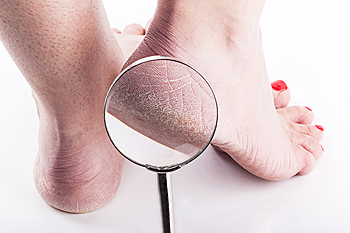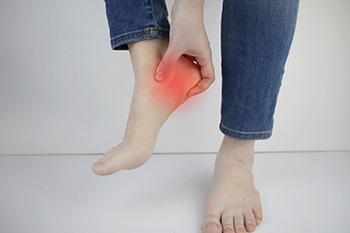Connect With Us
Blog
Items filtered by date: September 2023
Managing Severely Cracked Heels

Heel fissures are cracks that can develop on your heels, causing pain and potentially leading to infection if left untreated. The root cause of heel fissures often stems from the skin's lack of moisture. This can be the result of several underlying conditions, including fungal infection, diabetes, psoriasis, and eczema. The development of heel fissures can be accelerated by other factors as well, such as prolonged standing, regularly wearing open back shoes, and obesity. Prevention tips include applying a rich, hydrating foot cream consistently to maintain soft and supple skin. This can help to prevent cracked heels from turning into fissures. Regular exfoliation of the heels with a pumice stone after bathing helps to remove dead skin cells and promote healing. Preventing heel fissures involves staying well-hydrated, opting for supportive footwear, and maintaining a healthy weight. In severe cases, especially for persistent heel fissures that may have become infected, it is suggested that you make an appointment with a podiatrist as quickly as possible.
Cracked heels are unsightly and can cause further damage to your shoes and feet. If you have any concerns, contact Michael Tomey, DPM from Cary Foot & Ankle Specialists. Our doctor can provide the care you need to keep you pain-free and on your feet.
Cracked Heels
Cracked heels appear unappealing and can make it harder for you walk around in sandals. Aside from looking unpleasant, cracked heels can also tear stockings, socks, and wear out your shoes. There are several methods to help restore a cracked heel and prevent further damage.
How Do You Get Them?
Dry skin is the number one culprit in creating cracked heels. Many athletes, walkers, joggers, and even swimmers suffer from cracked heels. Age and skin oil production play a role to getting cracked heels as well.
Promote Healing
Over the counter medicines can help, especially for those that need instant relief or who suffer from chronic dry feet.
Wear Socks – Wearing socks with medicated creams helps lock in moisture.
Moisturizers – Applying both day and night will help alleviate dryness which causes cracking.
Pumice Stones – These exfoliate and remove dead skin, which allows for smoother moisturizer application and better absorption into the skin.
Change in Diet
Eating healthy with a well-balanced diet will give the skin a fresh and radiant look. Your body responds to the kinds of food you ingest. Omega-3 fatty acids and zinc supplements can also revitalize skin tissue.
Most importantly, seek professional help if unsure how to proceed in treating cracked heels. A podiatrist will help you with any questions or information needed.
If you have any questions, please feel free to contact our office located in Cary, NC . We offer the newest diagnostic and treatment technologies for all your foot care needs.
Fall Proofing the Home for Elderly Loved Ones

As we age, the risk of falls in our homes becomes a growing concern. The good news is that with a few thoughtful modifications, you can transform your living space into a safe haven for elderly family members. This can begin by decluttering walkways, ensuring clear, unobstructed paths, followed by removing tripping hazards such as loose rugs and electrical cords. Installing handrails and grab bars which can provide essential support, is critical in bathrooms and staircases. Adequate lighting is vital, and dimly lit areas can be brightened, in addition to adding nightlights which can reduce the risk of stumbling in the dark. Consider anti-slip flooring options to improve traction. In the bathroom, invest in a shower chair and non-slip mats to prevent accidents. Regular maintenance of your home's infrastructure, including checking for loose floorboards or uneven surfaces, is also important. If you would like additional information about effective methods to keep your home safe for senior family members, it is suggested that you consult with a podiatrist.
Preventing falls among the elderly is very important. If you are older and have fallen or fear that you are prone to falling, consult with Michael Tomey, DPM from Cary Foot & Ankle Specialists. Our doctor will assess your condition and provide you with quality advice and care.
Every 11 seconds, an elderly American is being treated in an emergency room for a fall related injury. Falls are the leading cause of head and hip injuries for those 65 and older. Due to decreases in strength, balance, senses, and lack of awareness, elderly persons are very susceptible to falling. Thankfully, there are a number of things older persons can do to prevent falls.
How to Prevent Falls
Some effective methods that older persons can do to prevent falls include:
- Enrolling in strength and balance exercise program to increase balance and strength
- Periodically having your sight and hearing checked
- Discuss any medications you have with a doctor to see if it increases the risk of falling
- Clearing the house of falling hazards and installing devices like grab bars and railings
- Utilizing a walker or cane
- Wearing shoes that provide good support and cushioning
- Talking to family members about falling and increasing awareness
Falling can be a traumatic and embarrassing experience for elderly persons; this can make them less willing to leave the house, and less willing to talk to someone about their fears of falling. Doing such things, however, will increase the likelihood of tripping or losing one’s balance. Knowing the causes of falling and how to prevent them is the best way to mitigate the risk of serious injury.
If you have any questions, please feel free to contact our office located in Cary, NC . We offer the newest diagnostic and treatment technologies for all your foot care needs.
Why Live with Pain and Numbness in Your Feet?
Causes and Treatment for Heel Pain

Heel pain, a common ailment, can be a source of discomfort that interferes with daily activities. The causes of heel pain can vary, with one of the most prevalent being plantar fasciitis. This condition involves inflammation of the plantar fascia, the thick band of tissue that supports the arch of the foot. Other common culprits include Achilles tendonitis, heel spurs, and bursitis. The good news is that heel pain is often treatable. Treatment options for heel pain range from conservative methods to more advanced interventions. Resting and performing gentle stretching exercises can provide relief, while custom-made orthotics may help distribute pressure more evenly. In severe or persistent cases, minimally invasive procedures such as corticosteroid injections may be recommended. Consulting a podiatrist is crucial in determining the underlying cause, in addition to guiding you toward the most suitable treatment plan. By addressing the root cause and following a tailored treatment regimen, you can take significant steps towards a pain-free and active lifestyle. It is strongly suggested that you visit a podiatrist who can accurately diagnose the cause for your heel pain and treat it accordingly.
Many people suffer from bouts of heel pain. For more information, contact Michael Tomey, DPM of Cary Foot & Ankle Specialists. Our doctor can provide the care you need to keep you pain-free and on your feet.
Causes of Heel Pain
Heel pain is often associated with plantar fasciitis. The plantar fascia is a band of tissues that extends along the bottom of the foot. A rip or tear in this ligament can cause inflammation of the tissue.
Achilles tendonitis is another cause of heel pain. Inflammation of the Achilles tendon will cause pain from fractures and muscle tearing. Lack of flexibility is also another symptom.
Heel spurs are another cause of pain. When the tissues of the plantar fascia undergo a great deal of stress, it can lead to ligament separation from the heel bone, causing heel spurs.
Why Might Heel Pain Occur?
- Wearing ill-fitting shoes
- Wearing non-supportive shoes
- Weight change
- Excessive running
Treatments
Heel pain should be treated as soon as possible for immediate results. Keeping your feet in a stress-free environment will help. If you suffer from Achilles tendonitis or plantar fasciitis, applying ice will reduce the swelling. Stretching before an exercise like running will help the muscles. Using all these tips will help make heel pain a condition of the past.
If you have any questions please contact our office located in Cary, NC . We offer the newest diagnostic and treatment technologies for all your foot and ankle needs.
What are the Causes and Treatments for Plantar Fasciitis?

Plantar fasciitis, a prevalent foot condition, can cast a shadow on even the most active lifestyles. It occurs when the plantar fascia, which is defined as the ligament connecting the heel bone to the toes, becomes inflamed or strained. There are various reasons for plantar fasciitis, often stemming from repetitive stress, poor footwear choices, obesity, or abnormal foot structures, such as flat feet. Symptoms encompass sharp heel pain, especially during the first steps in the morning or after periods of inactivity. As painful as this condition can be, there are various options that can be implemented. Treatment methods can range from rest, and taking over-the-counter pain medications to targeted exercises that stretch and strengthen the plantar fascia. In more severe cases, podiatrists may recommend custom orthotics or corticosteroid injections. With proper care and attention, managing plantar fasciitis can help individuals step back into a life unhindered by foot discomfort. If you have developed plantar fasciitis, it is strongly suggested that you are under the care of a podiatrist who can determine what the best course of treatment is for you.
Plantar fasciitis can be very painful and inconvenient. If you are experiencing heel pain or symptoms of plantar fasciitis, contact Michael Tomey, DPM from Cary Foot & Ankle Specialists. Our doctor can provide the care you need to keep you pain-free and on your feet.
What Is Plantar Fasciitis?
Plantar fasciitis is the inflammation of the thick band of tissue that runs along the bottom of your foot, known as the plantar fascia, and causes mild to severe heel pain.
What Causes Plantar Fasciitis?
- Excessive running
- Non-supportive shoes
- Overpronation
- Repeated stretching and tearing of the plantar fascia
How Can It Be Treated?
- Conservative measures – anti-inflammatories, ice packs, stretching exercises, physical therapy, orthotic devices
- Shockwave therapy – sound waves are sent to the affected area to facilitate healing and are usually used for chronic cases of plantar fasciitis
- Surgery – usually only used as a last resort when all else fails. The plantar fascia can be surgically detached from the heel
While very treatable, plantar fasciitis is definitely not something that should be ignored. Especially in severe cases, speaking to your doctor right away is highly recommended to avoid complications and severe heel pain. Your podiatrist can work with you to provide the appropriate treatment options tailored to your condition.
If you have any questions please feel free to contact our office located in Cary, NC . We offer the newest diagnostic and treatment technologies for all your foot and ankle needs.

